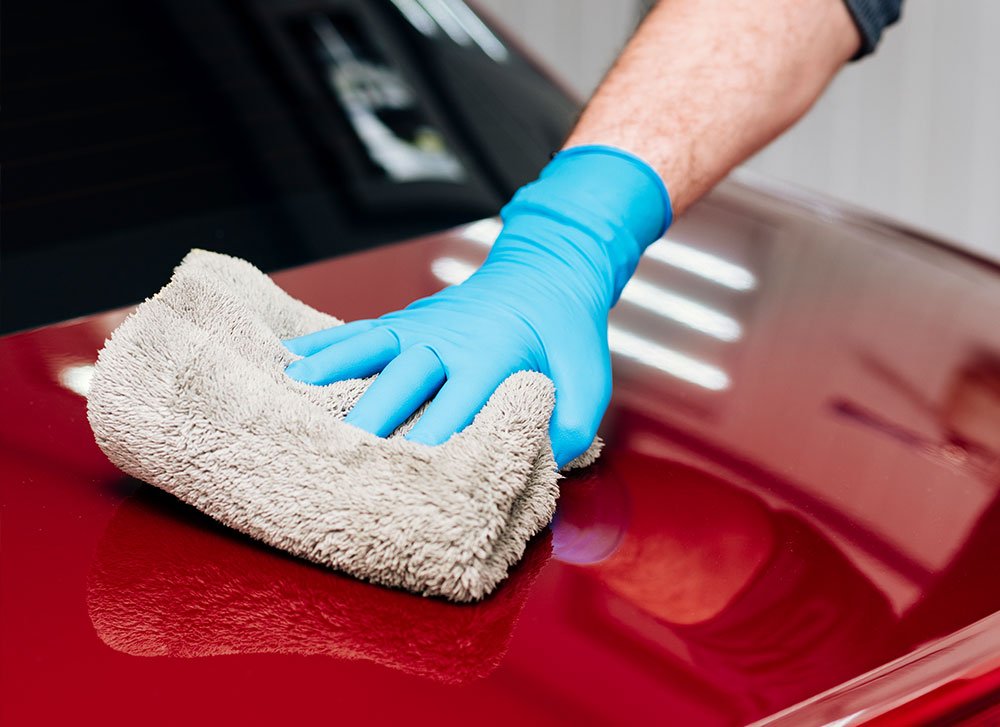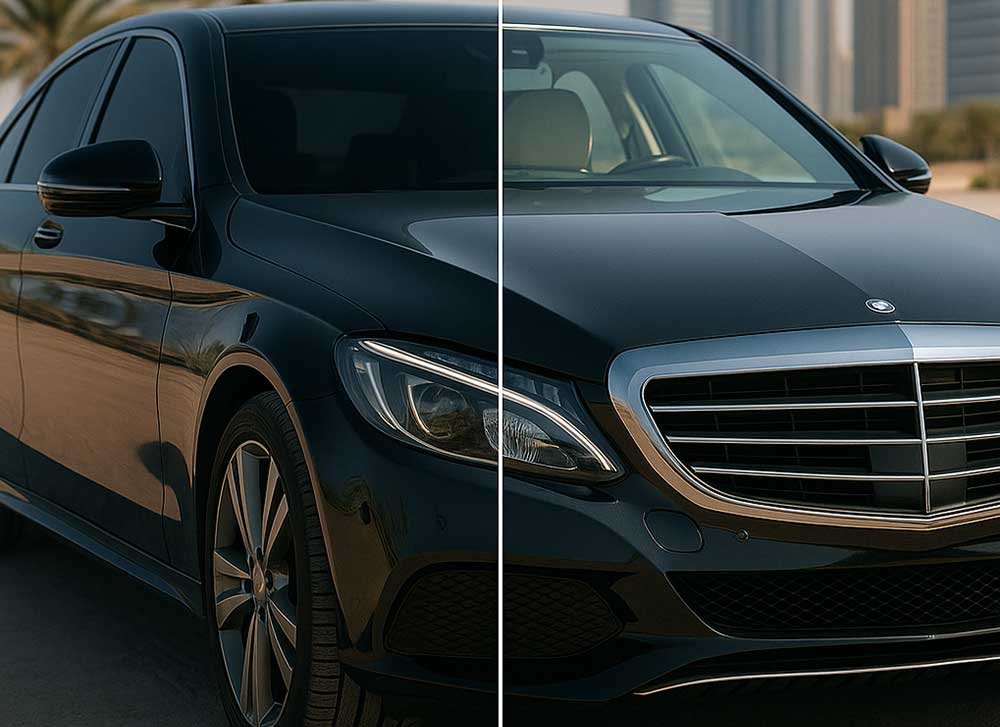Window Tinting is Essential in Dubai, Not Optional
If you live in Dubai, you know how quickly your car can turn into an oven under the UAE sun. With summer temperatures easily crossing 45°C, the interior of your vehicle can heat up to dangerous levels in minutes. Beyond the heat, prolonged sun exposure damages your car’s upholstery, dashboard, and electronics, not to mention making every drive uncomfortable.
That’s where window tinting comes in. But in Dubai, tinting isn’t just about blocking sunlight — it’s about comfort, safety, UV protection, legal compliance, and long-term preservation of your vehicle. At Wrapsters, we get many questions from clients about which tint to choose, how it works, and what the legal restrictions are. In this guide, we’ll break down everything you need to know.
Why Tinting is Almost Mandatory in Dubai’s Climate
The UAE’s climate creates specific challenges for car owners:
- Extreme heat: Direct sun can raise cabin temperatures dangerously.
- High UV exposure: Constant sun causes fading, cracking, and discoloration of interior materials.
- Blinding glare: Harsh sunlight often reflects off Dubai’s glass skyscrapers, creating dangerous driving glare.
- Increased fuel consumption: Hot interiors force your AC to work harder, using more fuel.
- Privacy concerns: Many drivers prefer privacy from prying eyes on busy Dubai roads and in car parks.
Professional window tinting addresses all of these challenges — but not all tint films offer the same performance.
Types of Window Tint Films Explained
There’s a wide range of tinting materials on the market. Here’s a closer look at the main types commonly offered in Dubai:
- Standard Dyed Tint
- How it works: A basic layer of dye blocks some visible light.
- Heat rejection: Low to moderate.
- UV protection: Limited.
- Cost: Inexpensive option.
- Durability: Fades and discolors faster under Dubai’s intense sun.
- Drawback: After 1–2 summers, dyed films often turn purple or bubble.
- Metallic Tint
- How it works: Embedded metallic particles reflect heat and UV rays.
- Heat rejection: Better than dyed films.
- UV protection: Good.
- Cost: Mid-range.
- Drawback: Metallic particles can interfere with radio, GPS, and mobile signals — a major issue in modern cars loaded with tech.
- Carbon Tint
- How it works: Uses carbon particles to block IR (infrared) heat and UV rays.
- Heat rejection: High.
- UV protection: Excellent.
- Durability: Longer lifespan than dyed or metallic films.
- Cost: More expensive but great long-term performance.
- Benefit: No signal interference.
- Ceramic Tint (Highly Recommended for Dubai)
- How it works: Uses nano-ceramic particles that block heat, glare, and UV while remaining crystal clear.
- Heat rejection: The highest of any tint type — excellent for Dubai summers.
- UV protection: Blocks up to 99% of harmful UV rays.
- Glare reduction: Superior.
- Signal interference: None — fully compatible with modern vehicle electronics.
- Cost: Premium price, but long-term protection.
- Durability: Typically lasts the life of the vehicle.
At Wrapsters, ceramic tinting remains our most popular recommendation for UAE clients because it delivers real, noticeable benefits in both comfort and vehicle preservation.
Legal Window Tint Limits in Dubai (As per RTA Regulations)
In the UAE, window tinting is legal, but there are clear restrictions:
- Maximum permitted tint level: 50% light transmission for side and rear windows.
- Windshield tinting: Not permitted unless you receive special RTA approval (exceptions may apply for medical conditions or VIP exemptions).
- Front driver and passenger windows: May be tinted up to the 50% limit.
- Mirror or reflective tints: Prohibited.
Violating tint regulations can result in fines and removal orders during annual RTA inspections. Dubai Police also actively monitor tint violations, particularly during roadside checks.
Important
These laws are periodically updated, so we always check the latest RTA regulations before starting any tint job to ensure your car remains fully compliant.
How Tinting Affects Driving Comfort in Dubai
The real-world benefits of proper tinting go far beyond appearances:
Feature | No Tint | Basic Tint | Ceramic Tint |
Cabin heat reduction | Minimal | Moderate | Maximum (up to 60% heat reduction) |
UV protection | None | Partial | 99% UV block |
Glare reduction | None | Some | Significant |
Interior fading | High risk | Reduced | Minimal |
AC load | High | Moderate | Low |
Driving comfort | Low | Average | Very high |


Many Wrapsters clients tell us that after switching to ceramic tint, they notice their AC cools the cabin faster, stays cooler longer, and reduces their fuel consumption — particularly during peak summer months.
How Long Does Professional Tinting Last in Dubai?
Properly installed, high-grade tint films can easily last 5–10 years depending on:
- Type of tint film
- Exposure to direct sunlight
- Frequency of car washing
- Parking (covered vs uncovered)
Cheap tints often fail after only 1–2 years, developing bubbles, fading, or peeling — especially under Dubai’s harsh UV rays.
At Wrapsters, we offer warranty-backed ceramic tint installations designed specifically to withstand Dubai’s conditions long-term.
DIY vs. Professional Tinting in Dubai
While DIY tint kits are widely sold online, they rarely hold up to Dubai’s unique heat and UV exposure. Improper application leads to:
- Visible bubbles
- Uneven cuts and gaps
- Poor edge sealing
- Premature peeling
- Legal compliance issues
Professional tinting at Wrapsters ensures:
- Flawless application in climate-controlled conditions
- Clean, dust-free finishes
- Perfect film alignment
- Full legal compliance
- Warranty coverage for peace of mind
Common Myths About Window Tinting in Dubai
Myth 1: Darker tints = better heat protection.
Truth: Heat rejection depends on film technology, not darkness. High-end ceramic films can be almost clear while blocking significant heat.
Myth 2: Tinting damages car windows.
Truth: Professional tinting does not damage glass. In fact, it can strengthen windows and reduce shattering in accidents.
Myth 3: Tinting is illegal in Dubai.
Truth: Tinting is legal up to the 50% limit, as long as you follow RTA guidelines.
Why Choose Wrapsters for Your Car Tinting in Dubai
At Wrapsters, we combine:
- Premium-grade ceramic tint films
- Certified installers with years of Dubai experience
- Climate-controlled application bays
- Full legal compliance with RTA standards
- Warranty-backed protection
We’ve installed tint on everything from family sedans to Rolls-Royces, luxury SUVs to exotic supercars — always with attention to detail and long-term results in mind.
Conclusion: Tinting Is Protection, Not Decoration
In Dubai, window tinting isn’t just about looks — it’s about preserving your investment, protecting your health, staying comfortable, and complying with the law.
Contact Wrapsters today to schedule your professional window tinting appointment and experience true driving comfort, even in Dubai’s peak summer heat.








